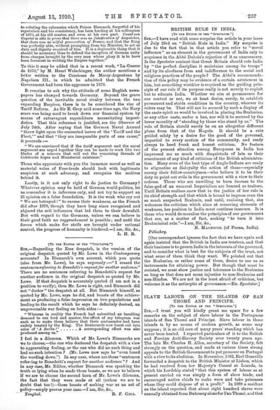BRITISH RULE IN INDLL
LTO TER Eprros or vas " Srscrivos..") Sin,—I have read with some surprise the article in your issue of July 23rd on "British Rule in India." My surprise is due to the fact that in that article you refer to "moral influence" as an element in the government of India only to acquiesce in the Abbe Dubois's rejection of it as unnecessary. Is the Spectator content that Great Britain should rule India by "the perfect discipline it maintains among its troops" and by its aloofness from and indifference to the social and religious practices of the people ? The Abbe's recommenda- tion of this policy may be evidence of a certain astuteness in him, but something worthier is required as the guiding prin. ciple of our rule if its purpose really is not merely to exploit but to educate India. Whether we aim at permanence for our control or not, we at least desire, surely, to establish permanent and stable conditions in the country, whoever its rulers may be. That will not be secured by such a display of the caste-spirit as would be involved in placing the Brahmins, or any other caste, under a ban, nor will it be secured by the lower morality of "standing by those who stand by us." The rule of Britain should surely be on an altogether different plane from that of the Moguls. It should be a rule guided solely by a desire for the good of the governed, impartial to every section of the community, and ready always to heed frank and honest criticism. No feature of the present situation among Europeans in India has impressed me so much with disquietude of late as their resentment of any kind of criticism of the British administra- tion Many even of the best type of Anglo-Indians are ready to stigmatise as disloyalty the action of those—especially among their fellow-countrymen—who believe it to be their duty to point out evils in the government with a view to their redress. Those who are unwilling to burn incense to the false god of an unmoral Imperialism are banned as traitors. Until Britain realises anew that in the justice of her rule is its chief strength and that which is bound to impress even the so much suspected Brahmin, and until, realising that, she welcomes the criticism which aims at removing elements of weakness, her position in India must continue insecure. It is those who would de-moralise the principles of our government that are, as a matter of fact, seeking "to turn it into Brahminical rule."—I am, Sir, &c., [Our correspondent ignores the fact that we have again and again insisted that the British in India are trustees, and that their business is to govern India in the interests of the governed, and to consider what is best for the subjects of the trust, not what some of them think they want. We pointed out that the Brahmins, or rather some of them, desire to use us as instruments for attaining power. But though that must be resisted, we must show justice and tolerance to the Brahmins so long as that does not mean injustice to non-Brahmins and non-Hindus. We are not in the least afraid of criticism, but welcome it as the antiseptic of governance.—ED. Spectator.]






































 Previous page
Previous page